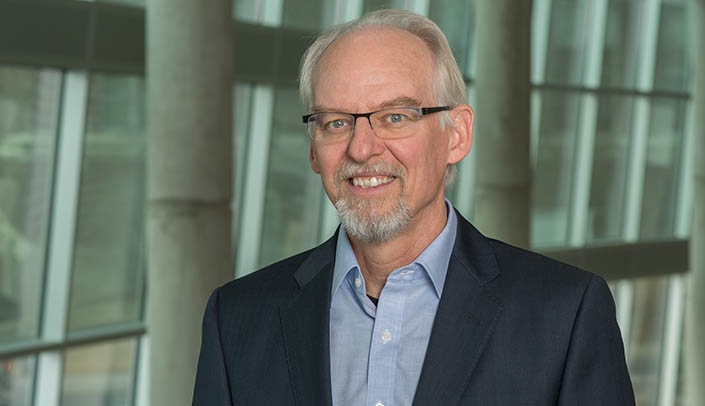This profile is part of a series to highlight the researchers who will be honored at a ceremony for UNMC’s 2018-19 Scientist Laureate, Distinguished Scientist, Research Leadership and New Investigator Award recipients.
The Distinguished Scientist Award
The Distinguished Scientist Award — which is sponsored by the chancellor — recognizes researchers who have been among the most productive scientists at UNMC during the past five years.
- Name: David Dzewaltowski
- Title: Professor and Endowed Community Chair for Physical Activity, Nutrition, and Obesity, the UNMC College of Public Health Department of Health Promotion. (Community Chair was created and is funded by Buffett Early Childhood Institute.)
- Joined UNMC: January 2017
- Hometown: Raised in Seattle, lived in Manhattan, Kan.
Research focus:
Whole-of-community prevention for children
The goal of my research is:
The Dzewaltowski lab focuses on community systems and their practices, how communities create the conditions in which children grow, learn, and play that determine health promoting behaviors, and methods to facilitate the diffusion of evidence-based practices into community systems for population health improvement and the prevention of cancer and other chronic conditions. We link measures of community population cancer prevention behaviors (such as child physical activity) with measures of directly observed group practices in community places (such as clinics, child care centers, schools, after school programs, clubs, and youth sport) and study the impact of new evidence-based ideas on implemented practices and health behaviors.
My research will make a difference because:
Communities across the U.S. and internationally are working to improve population health to increase child health and development, prevent cancer later in life, and to decrease health care costs. There is evidence that where children and families live influence their health and development. Eight percent of young children living in low income families in Utah are obese, while 20 percent living in Virginia are obese. In Nebraska, 16.9 percent of low-income family young children are obese. There is a great need to improve community conditions for children.
The best advice I’ve ever been given is:
In a world focused on things, life is about people and relationships.
Three things you may not know about me are:
- I was a collegiate competitive distance runner and ran the Grand Canyon and Pikes Peak.
- My family likes old cars and old houses.
- My wife has a century farm in Iowa.
